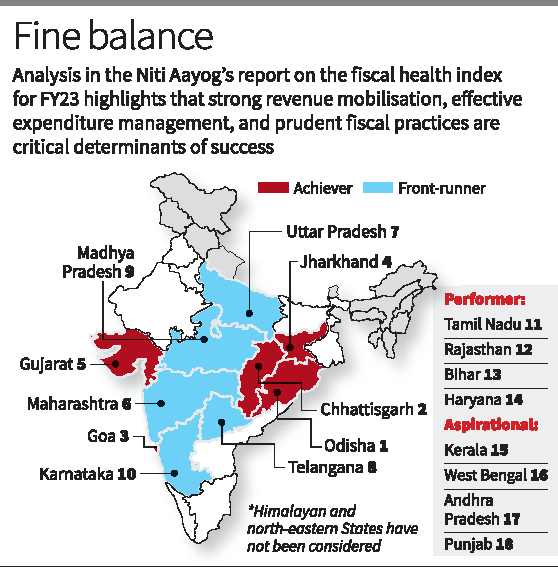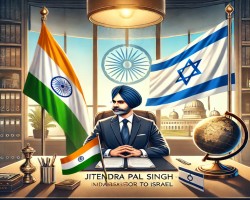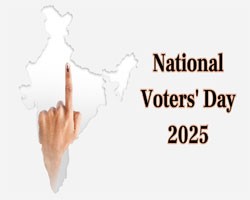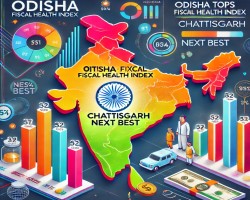UPSC Current Affairs
TABLE OF CONTENTS |
| International Relations |
|---|
|
|
|
Why in the News?
India has appointed Jitendra Pal Singh as its new Ambassador to Israel. His appointment comes at a crucial juncture as the ceasefire agreement between Israel and Hamas in Gaza progresses, with renewed hopes for stability in the region. Mr. Singh will succeed Sanjeev Singla, who has been appointed as India’s Ambassador to France. Key Takeaways Strategic Timing: Mr. Singh’s tenure begins amid the Israel-Hamas ceasefire, a significant development in regional geopolitics. His role will involve strengthening defence and trade ties between India and Israel. Focus on Reconstruction: India’s participation in Gaza’s reconstruction efforts, should the ceasefire hold, could enhance its diplomatic involvement in the region. Multilateral Engagements: There is optimism about reviving initiatives such as the I2U2 (India-Israel-U.S.-UAE) partnership and the India-Middle East-Europe Economic Corridor, which have been on hold since the October 2023 conflict. Do You Know? Mr. Singh has extensive experience in handling critical diplomatic portfolios, including Iran, Pakistan, and Afghanistan. He played a key role in managing the fallout of major incidents such as the Pathankot and Uri terror attacks and oversaw the construction of the Kartarpur corridor for Sikh pilgrims. Mr. Singh was also instrumental in reopening India’s technical mission in Kabul post-Taliban takeover. Static Points about India’s Ambassador to Israel Key Responsibilities: The Ambassador to Israel plays a vital role in fostering India-Israel ties, particularly in defence, agriculture, and technology sectors. Bilateral Workforce: Increasing numbers of Indian workers are being sent to Israel, indicating growing cooperation in infrastructure and labor exchange projects. Historical Context: India-Israel diplomatic relations have grown significantly since their establishment in 1992, with deepening collaborations in strategic and economic areas. Insightful Observation Jitendra Pal Singh’s extensive diplomatic experience and strategic acumen make him a strong candidate for the position. His role in navigating sensitive geopolitical situations, such as the Iran-Pakistan balance and U.S.-Taliban negotiations, reflects India’s commitment to enhancing its global influence while maintaining regional stability. |
|
|
|
About Israel:
Capital: Jerusalem President: Isaac Herzog Prime Minister: Benjamin Netanyahu Currency: New shekel (₪) (ILS) |
|
|
|
Why in the News?
Micheál Martin has been re-elected as Ireland's Taoiseach (Prime Minister) on January 23, 2025, following a parliamentary vote. With 95 votes in favor and 76 against, Martin's reappointment marks his second term after previously serving from 2020 to 2022. The formation of the new government continues the coalition between Fianna Fáil, Fine Gael, and independent lawmakers, addressing pressing national and economic challenges. Aim The coalition government led by Micheál Martin aims to provide stable governance by uniting Ireland’s major political parties. It seeks to tackle critical issues such as economic resilience, gender representation in politics, and public sector development while navigating the evolving international economic landscape. Key Takeaways Coalition Dynamics: The government is a continuation of the alliance between Fianna Fáil and Fine Gael, Ireland's dominant center-right parties since 1937, along with independent lawmakers. Cabinet Appointments: The new cabinet, comprising 15 members, has faced criticism for including only three women, underscoring gender representation concerns in Irish politics. Economic Initiatives: Plans are in place to utilize tax surpluses from U.S. multinationals to: Invest in public sector projects Enhance infrastructure Reduce taxes Create a sovereign wealth fund to strengthen Ireland’s economic resilience Do You Know? Micheál Martin’s return as Taoiseach marks a significant moment in Ireland's political landscape, continuing his leadership in addressing post-pandemic economic recovery and maintaining Ireland’s international standing. Ireland's economy is deeply tied to U.S. multinational corporations, with tax reforms under U.S. President Donald Trump potentially impacting Ireland's corporate tax policies. Fianna Fáil and Fine Gael are historic rivals but formed their first coalition in 2020 to provide stable governance. Static Points About Micheál Martin Reappointed as Irish PM Second Term: Micheál Martin previously served as Taoiseach from 2020 to 2022 and has returned to office in 2025. Parliamentary Vote: The reappointment saw a decisive 95-76 vote in favor. Challenges Ahead: Managing economic uncertainty from U.S. trade and tax reforms. Addressing domestic criticism over gender representation and inclusion of controversial figures in the cabinet. Strengthening public trust in governance while fostering economic resilience. |
|
|
|
Why in the News?
On January 23, 2025, Thailand made history as the first Southeast Asian nation to legalize same-sex marriage. The Marriage Equality Act grants LGBTQ+ couples equal rights in areas such as adoption, inheritance, and medical decisions, marking a significant step forward for inclusivity and equality in the region. Aim The Marriage Equality Act seeks to establish legal parity for same-sex couples, ensuring they enjoy the same legal, financial, and social rights as heterosexual couples. This legislation also symbolizes Thailand’s broader commitment to fostering inclusivity and protecting LGBTQ+ rights. Key Takeaways First in Southeast Asia: Thailand joins Taiwan and Nepal as pioneers in legalizing same-sex marriage in Asia. Widespread Jubilation: On the law’s first day, 1,832 couples registered their unions across the country, including 654 in Bangkok and 185 at a celebratory event at the Siam Paragon mall. Legal Reforms: The Marriage Equality Act replaces gender-specific terms like "husband and wife" with gender-neutral terms such as "individuals" and "marriage partners." Equal Rights: Same-sex couples now have equal rights in adoption, inheritance, and medical decision-making. Support from Leadership: Prime Minister Paetongtarn Shinawatra hailed the law as a reflection of Thailand’s values of love and equality. Do You Know? Thailand's progress in LGBTQ+ rights has been decades in the making, driven by persistent advocacy efforts. The Marriage Equality Act was ratified by King Maha Vajiralongkorn in September 2024, following Parliament’s overwhelming approval in June 2024. Thailand is known for its cultural acceptance of LGBTQ+ individuals, though its conservative societal values made this achievement a significant milestone. Static Points About Same-Sex Marriage in India and the World Global Context: As of now, more than 35 countries worldwide have legalized same-sex marriage, including nations like the U.S., Canada, Germany, and South Africa. India's Stance: In India, same-sex marriage is not yet legally recognized. However, the Supreme Court's 2018 verdict decriminalizing homosexuality was a landmark decision for LGBTQ+ rights. Asian Leaders: Alongside Thailand, Taiwan was the first Asian country to legalize same-sex marriage in 2019, followed by Nepal in select districts. Cultural Impact and Government Support Thailand’s decision is not just a legal victory but a cultural one. The inclusion of gender-neutral terms in legal documents signifies a shift toward breaking down societal barriers. The government’s commitment to honoring "all forms of love" sets a progressive example for other countries in the region. IN SHORT: Thailand Legalizes Same-Sex Marriage On January 23, 2025, Thailand became the first Southeast Asian country to legalize same-sex marriage, ensuring equal rights for LGBTQ+ couples. The Marriage Equality Act provides legal, financial, and medical rights to same-sex couples, including adoption and inheritance. Over 1,832 couples registered their marriages on the first day, with 654 in Bangkok, marking widespread celebration across the nation. This historic milestone positions Thailand alongside Taiwan and Nepal as leaders in LGBTQ+ rights in Asia. Prime Minister Paetongtarn Shinawatra hailed the law, stating that "all love will now be honored by law in Thailand," showcasing government support for equality. |
| Science and Technology |
|
|
|
Why in the News?
The Indian Space Research Organisation (ISRO) is set to achieve a significant milestone with its 100th launch from the Satish Dhawan Space Centre in Sriharikota. Scheduled for January 29, the launch will deploy the GSLV-F15 NVS-02 mission, marking another step forward in India’s space and navigation advancements. Key Takeaways: Mission Overview: The GSLV-F15 will place the NVS-02 satellite into a Geosynchronous Transfer Orbit, enhancing India's regional navigation system, NavIC (Navigation with Indian Constellation). Satellite Details: NVS-02, part of the second-generation NavIC satellites, incorporates advanced navigation payloads in L1, L5, and S bands and features both indigenous and procured atomic clocks for precise timekeeping. Strategic Importance: NavIC is India’s independent navigation system designed for accurate Position, Velocity, and Timing (PVT) services across the country and up to 1,500 km beyond its borders, ensuring strategic self-reliance in navigation. Do You Know? NavIC provides two services: the Standard Positioning Service (SPS) for civilian use and the Restricted Service (RS) for strategic users. With an accuracy of better than 20 metres for positioning and better than 40 nanoseconds for timing, NavIC ensures reliable navigation services in its primary coverage area. The NVS-01 satellite, launched in May 2023, was the first to feature an indigenous atomic clock, highlighting India’s growing technological capabilities. Static Points about ISRO Missions: The GSLV-F15 mission will launch from the second launch pad at the Satish Dhawan Space Centre, emphasizing ISRO's operational expertise. The NVS-02 satellite, designed on the I-2K platform with a mass of 2,250 kg, will replace the IRNSS-1E satellite at 111.75°E. ISRO’s U. R. Satellite Centre (URSC) spearheaded the design and development of NVS-02, showcasing India's strong ecosystem of space research and collaboration. Conclusion: ISRO’s 100th launch not only marks a historic milestone but also highlights India’s relentless strides in space technology and self-reliant navigation systems. With the NVS-02 satellite, NavIC continues to strengthen its strategic and civilian services, reinforcing India’s position as a key player in the global space arena. |
|
|
|
About Indian Space Research Organisation (ISRO):
Formed: 15 August 1969 Preceding agency: INCOSPAR (1962–1969) Headquarters: Bengaluru, Karnataka Chairman: V Narayanan (11th Chairman of the Indian Space Research Organisation) Primary spaceports: Satish Dhawan Space Centre, Thumba Equatorial Rocket Launching Station, Kulasekarapattinam Spaceport |
| Sports |
|
|
|
Why in the News?
India’s star left-arm pacer Arshdeep Singh has been named the ICC Men’s T20I Cricketer of the Year 2024 by the International Cricket Council (ICC). His outstanding performance played a key role in leading the Indian cricket team to victory at the T20 World Cup. Key Takeaways: Outstanding Performance: Arshdeep Singh claimed 36 wickets in 18 matches in 2024. His bowling was crucial in the T20 World Cup, especially in the group stages against the USA and in the final against Barbados. Recognition: Arshdeep was also named in the ICC T20I Team of the Year 2024 alongside teammates Rohit Sharma, Jasprit Bumrah, and Hardik Pandya. Rohit Sharma was selected as the captain of the ICC T20I Team of the Year. Statistics: Arshdeep took wickets at an average of 15.31, with an impressive economy rate of 7.49. His strike rate was 10.80, showing his effectiveness in taking wickets consistently. Do You Know? At the T20 World Cup, Arshdeep Singh claimed figures of 4/9 in his four overs against the USA team in the group stages. He played a critical role in the T20 World Cup final, ending with figures of 2/20 and helping India defend a total of 176. Rankings Only four players globally claimed more T20I wickets than Arshdeep in 2024: Usman Najeeb (38), Wanindu Hasaranga (38), Junaid Siddique (40), and Ehsan Khan (46). Among these, only Hasaranga featured for a full-member nation, highlighting Arshdeep’s exceptional performance at the highest level. IN SHORT Arshdeep Singh was named ICC Men’s T20I Cricketer of the Year 2024 for his exceptional bowling performances. He took 36 wickets in 18 matches with a strike rate of 10.80 and an economy of 7.49. His efforts in the T20 World Cup helped India win the title, including key performances against the USA and West Indies. Arshdeep joined Rohit Sharma, Jasprit Bumrah, and Hardik Pandya in the ICC T20I Team of the Year. Rohit Sharma was named captain of the ICC Men’s T20I Team of the Year 2024. |
|
|
|
About International Cricket Council (ICC):
The International Cricket Council (ICC) is the world governing body of cricket. Formation: 15 June 1909 Headquarters: United Arab Emirates Dubai, United Arab Emirates Chairman: Jay Shah (India) (4th Chairman of the International Cricket Council) CEO: Geoff Allardice (Australia) General Manager: Wasim Khan (England) |
| Important Days |
|
|
|
Context:
Every year on January 25, India celebrates National Voters’ Day which marks the foundation of the Election Commission of India (ECI) in 1950. This special day, observed since 2011, aims to encourage voter participation and raise awareness about the importance of voting. It highlights the role of citizens in shaping the future of the nation through their votes. National Voters’ Day 2025: Theme The theme for National Voters’ Day 2025 is ‘Nothing like voting, I vote for sure’. This theme continues from last year. It highlights the importance of voting as a crucial tool for shaping the country’s leadership. National Voters’ Day 2025: History National Voters’ Day was introduced in 2011 to encourage young people to register as voters. The initiative came after it was noticed that many eligible youth were not signing up to vote. The then government, led by Prime Minister Manmohan Singh, decided to create a special day to focus on enrolling these young voters and giving them their voter identity cards (EPIC). January 25 was chosen for the occasion because it marks the day the Election Commission of India was established in 1950. National Voters’ Day 2025: Significance National Voters’ Day is an important occasion that highlights the significance of voting as both a right and a responsibility in a democracy. The day aims to spread awareness about the importance of voting and encourages citizens to actively participate in the electoral process. A key focus is on helping first-time voters by registering them and providing voter ID cards on this day. National Voters’ Day also plays a vital role in promoting electoral literacy by organising campaigns that educate people about the voting process and the impact of their vote. The day also celebrates the Election Commission of India and recognises its efforts in ensuring free, fair and transparent elections. Electorate Milestone: India’s voter base nears the 100 crore mark, with 99.1 crore registered voters, including 21.7 crore young electors (18-29 age group) and an improved Electoral Gender Ratio (from 948 in 2024 to 954 in 2025). Highlights of the 15th NVD: The President of India will present the Best Electoral Practices Awards. The Best Electoral Practice Award acknowledges excellence in election management, with awards for District Election Officers, Superintendents of Police, and states demonstrating exceptional performance. The ECI Coffee Table Book "India Votes 2024: A Saga of Democracy" and the publication "Belief in the Ballot: Human Stories Shaping India’s 2024 Elections" will be presented to the President. |
|
|
|
About Election Commission of India (ECI)
Autonomous Constitutional Authority Administers Union/State elections: LS, RS, State LA, the offices of the President and VP Established: 25th January 1950 (National Voters’ Day) Constitutional Provisions Part XV - Article 324 to 329 Structure 1 Chief Election Commissioner and 2 Election Commissioners appointed by the President Tenure: 6 years, or up to the age of 65 years, whichever is earlier Retiring ECs: Eligible for further appointment by the government Removal of CEC: Based on proven misbehavior or incapacity Requires a resolution supported by a majority of 2/3rd members present and voting, supported by more than 50% of the total strength of the house Major Roles and Responsibilities Determining Electoral Constituencies Preparing/Revising Electoral Rolls Notifying the schedules and dates of elections Registering political parties and granting them the status of national or state parties Issuing the Model Code of Conduct (MCC) for political parties Advising the President on matters concerning the disqualification of MPs Challenges Truncated Tenure of CEC Executive Influence in Appointments Dependence on Centre for Finance Lack of Independent Staff Current and 25th Chief Election Commissioner of India: Rajiv Kumar |
| Reports And Indices |
|
|
|
Why in the News?
Odisha has emerged as the top-performing state in the NITI Aayog’s first-ever Fiscal Health Index (FHI) for 2022-23, achieving an impressive score of 67.8. This report evaluates the fiscal performance of 18 major Indian states that significantly contribute to the country’s economy. Chhattisgarh, Goa, and Jharkhand were also recognized as achievers, while Punjab, Andhra Pradesh, West Bengal, and Kerala ranked at the bottom. Aim The Fiscal Health Index aims to provide a comprehensive assessment of states' fiscal performance and stability, helping policymakers identify strengths and areas for improvement. It measures states based on fiscal parameters such as revenue generation, expenditure quality, debt sustainability, and fiscal management. Key Takeaways Top Performers: Odisha, Chhattisgarh, Goa, Jharkhand, and Maharashtra scored high due to revenue surplus, low fiscal deficits, and effective non-tax revenue mobilization. These states also recorded high capital outlay, up to 4% of their Gross State Domestic Product (GSDP). Front-Runners: States like Maharashtra, Uttar Pradesh, Telangana, Madhya Pradesh, and Karnataka excelled in developmental expenditure, balanced fiscal management, and sustainable debt ratios of 24% of GSDP. Struggling States: Punjab, Andhra Pradesh, West Bengal, and Kerala face significant fiscal challenges. These "aspirational" states are grappling with low revenue generation, high fiscal deficits, and unsustainable debt burdens. Odisha’s Standout Performance: Odisha topped the debt index (99.0) and debt sustainability (64.0), maintaining low fiscal deficits and a robust debt profile. Do You Know? The Fiscal Health Index 2025 is the first report of its kind from NITI Aayog. Data used for the report were sourced from the Comptroller and Auditor General (CAG). Odisha’s capital outlay-to-GSDP ratio and effective revenue mobilization contributed significantly to its top ranking. The top-performing states reported developmental expenditure as high as 73% of total expenditure. Static Points About NITI Fiscal Health Index Purpose: The FHI helps assess the financial health of Indian states to guide policymakers. Methodology: States are ranked based on parameters such as revenue surplus, debt sustainability, fiscal deficit, and capital outlay. Categories: States were classified into four groups: Achievers, Front-Runners, Performers, and Aspirational States. Achiever: Jharkhand (4) Chhattisgarh (2) Gujarat (5) Odisha (1) Front-runner: Uttar Pradesh (7) Maharashtra (6) Goa (3) Karnataka (10) Telangana (8) Madhya Pradesh (9) Performer: Tamil Nadu (11) Rajasthan (12) Bihar (13) Haryana (14) Aspirational: Kerala (15) West Bengal (16) Andhra Pradesh (17) Punjab (18) Fine Balance: Analysis in the Niti Aayog’s report on the fiscal health index for FY23 highlights that strong revenue mobilisation, effective expenditure management, and prudent fiscal practices are critical determinants of success. Insightful Observation Odisha's consistent fiscal discipline and effective governance set a benchmark for other states. The FHI highlights the importance of prudent fiscal management in achieving sustainable economic growth and development. Policymakers should leverage this data to address fiscal disparities and strengthen the financial health of struggling states. 
|
|
|
|
About NITI Aayog:
Formed: 1 January 2015 Headquarters: New Delhi Chairperson: PM (Current Chairperson - Narendra Modi) Vice Chairperson: Suman Bery CEO: B. V. R. Subrahmanyam Parent Government Agency: Ministry of Planning |
|
<< 24-Jan-25
|
|
|






